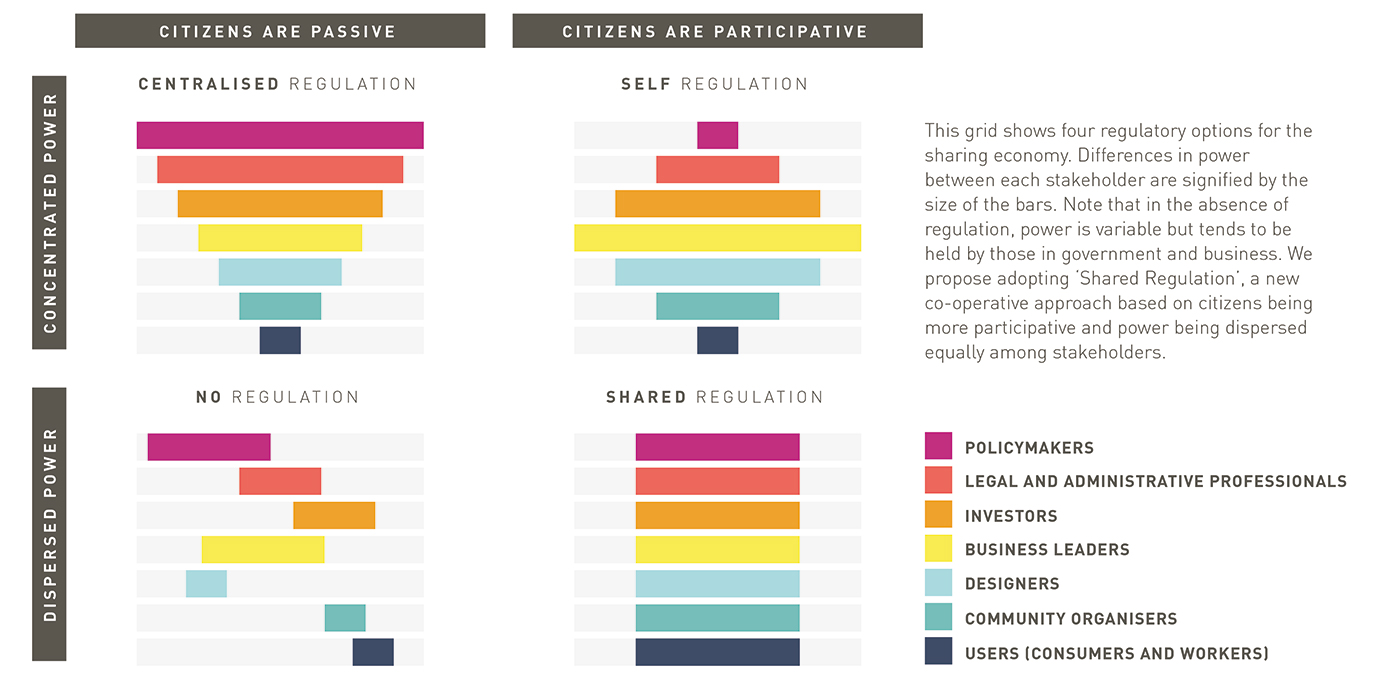The Business, Innovation and Skills (BIS) Select Committee have published a report on the UK’s digital economy, which the RSA provided evidence for earlier this year in February.
The Committee urged government to clarify its digital strategy, especially given the implications of Britain’s withdrawal from the EU, and its regulation of ‘disruptive’ tech platforms, such as Uber and Airbnb. Similarly to the RSA, the Committee recommended that a more ‘collaborative’ approach to regulation is needed, involving both platforms and their users in ensuring compliance. However, what would a collaborative approach or, as the RSA calls it, ‘shared regulation’ mean in practice?
It’s useful to keep in mind that shared regulation is an entirely new approach to governing the sharing economy. There are broadly four ways of regulating the sharing economy as the grid below shows, but shared regulation is the only means of both dispersing power and involving citizens in a participative process. Centralised regulation, favoured by countries such as France, Germany and Spain when it comes to the sharing economy, is ultimately a top-down approach that has relied on pulling a single lever to assert control – banning platform providers that are challenging traditional ways of doing business and are changing the way we work. Conversely, the UK has opted for light regulation, bordering on almost no regulation, and has encouraged platforms to self-regulate (for example, through the use of rating and review systems to address issues of safety and security). There are some rules in place (for example, limiting individuals’ short-term rentals through platforms, such as Airbnb, to 90 days per year), but under this scenario it is still government and businesses that have the most power – users, as well as other stakeholders, such as investors, designers, and representatives of civil society, have little influence.
Shared regulation seeks to redress this power imbalance by factoring in the views of all players with a stake in how the sharing economy evolves. We think that users in particular should be at the centre of the regulatory process because they could play a greater role in compliance; for example, it makes more sense to appeal to users directly for their cooperation given the recent interest in further decentralising platforms through the use of blockchain technology and cutting out intermediaries like Uber altogether. Needing platform providers to in turn force users to comply with city or country laws is a struggle in the immediate and a wasted effort in the long run as the role of platforms as middlemen becomes diminished.
At the FT’s Sharing Economy Summit earlier this month, I also spoke about how we need to reframe regulation as an enabler rather than as an inhibitor. It is important to encourage the sector to develop in a way that still nurtures the promise of social and environmental good along with economic prosperity. In this vein, the government’s recent inquiry into how to support mission-led businesses (for-profit businesses that make a powerful commitment to social impact) is very welcome as an example of how we can positively shape the UK’s culture of innovation and entrepreneurship.
Moving forward, how do we do now realise this stated ambition of collaborative regulation? The RSA will be trialling shared regulation as part of our next phase of research, which will be focused on the welfare of gig workers in the sharing economy. We’ll be convening platform providers and their users, investors, designers, legal experts and members of civil society organisations to feed into and reflect on recommendations for how we can ensure gig work can also be good work.
Find out more about the RSA Sharing Economy research
If you have thoughts on how the RSA can further develop the concept of shared regulation, feel free to comment below or get in touch with me directly at [email protected].
Related articles
-
Banning Airbnb and Uber isn't sustainable in a global sharing economy
Brhmie Balaram
Brhmie Balaram offers a breakdown of why banning Airbnb and Uber isn't a viable long-term solution in a global sharing economy.



Be the first to write a comment
Comments
Please login to post a comment or reply
Don't have an account? Click here to register.